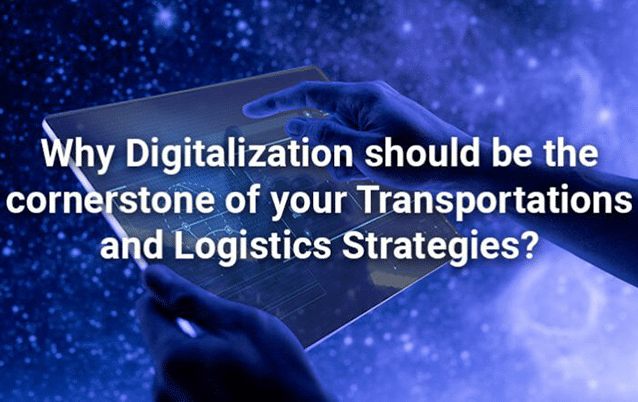Why Digitalization should be the cornerstone of your Transportations and Logistics Strategies
July 18, 2023 Logistics back office services
The future of transportation & logistics industry is bright. Today, forwarders admire the importance of digitalization and digitization in their forwarding business. They can not only come up with highly rewarding business ideas but also quickly wrap up any unsuccessful strategies.
In the past couple of years, specially after the global outbreak of deadly coronavirus, the transportation and logistics industry has completely changed. During recent pandemic lockdown, the forwarders who were running their freight and logistics business on the digital platform were the least affected. While those who were following the traditional business practices got wiped out of the market.
Digitalization has saved the global economy from becoming standstill. It the perfect answer for various limitations attached with the traditional approach. This major shift will stay here for long, because of its attached benefits.
So in this article we will look into those benefits which compel forwarders to framing their business strategies around the digitalization. But before discussing much about the digitalization, we must look into what our national and international bodies are saying about it.
As per the 46th annual report of World Economic Forum 2016, Davos, Switzerland
The theme of the 46th annual report of World Economic Forum 2016, Davos, Switzerland, was Mastering the Fourth Industrial Revolution. As per this report, the third decade (2020-2030) of the 21st century will witness most industries undergoing the digitization process. In the coming future, the digital transformation will completely envelop the global economy which includes the transportation and logistics sector.
Klaus Schwab, the founder of the World Economic Forum, described the fourth industrial revolution as the combination of hardware, software, and biology (cyber-physical systems). Here the cyber-physical systems mean a computer system that runs on the mechanism controlled or monitored by the computer-based algorithms and exhibit multiple and distinct behavioural modalities like human beings.
In this way, the companies which will work intertwine with the technology will rule the economy, while the companies resisting these inevitable changes will get washed away.
This ongoing digitalization and automation of traditional manufacturing and industrial practices will benefit all industries irrespective of the work. Even the Logistics and freight industries have not remained untouched, and they are getting unparalleled benefits by onboarding the software that can run their machines with cognitive abilities like humans.
How digitalization helps logistics industries achieving zenith and becoming fail-proof?
Digitization means capturing and converting an analog signal into a digital form to generate a digital representation that can be electronically processed or stored for our future use. It is a method through which logistics companies connect their entire supply chain work and get 360-degree visibility.
Nowadays, with digitalization, logistics companies have become well-equipped with a higher degree of artificial intelligence. They store online data to analyse and detect some patterns, which helps in framing future business plans. Till 1993, only 3% of the business units were using online information, and this figure has reached 94% by 2007. The better data and transactions are processed, the seamless machine-to-machine communication (M2M) will happen. And these all will result in attaining a fully automated supply chain and logistics industrial work.
Building a logistics network with digital technologies offers a new degree of resiliency and creates a pro-competitive business environment. This high-tech network provides the most efficient and transparent service delivery to its customers. With digitalization, a company can maintain large-scale logistics data and apply complex algorithms to them, which helps them saving money, increasing margins, and operating a more cost-effectively and environmentally friendly supply chain network.
According to the World Economic Forum, digitization in the logistics industry could provide $1.5 trillion in value through the year 2025. The digital logistics ecosystem has four key enablers: technology, process, organization, and knowledge. If we Integrate technology properly and apply them with technical expertise across the supply chain business, then the success rate of those digital logistics strategies is always high.
Top 6 reasons logistics companies noticing the maximum impact of digitalization
- Improved communication– Digital platform allows logistics companies to equip their customers with an end-to-end communicable network. The Oracle data an 87% of shippers reveal that they desire to work with logistics companies having good tracking and tracing facilities.
- Cooperation– In the logistics business, companies regularly deal with the national or international cargo shifts, and digitalization allows them to share warehouse and transport capabilities with others. Technologies allow a seamless inter-organizational information exchange within two organizations.
- Connectivity– Digitization enables horizontal integration with their competitors and business partners while vertical integration from supplier to customer along the supply chain to sustain end-to-end visibility.
- Adaptiveness– Digitalization allows logistics companies to run the dynamic adaptable system, with which they can customise and characterize their entire business components as per the need of time.
- Integration– Digitalization enhances the ability of a system to connect, monetize, integrate, and share any data, system, device, and process in near or real-time. Nowadays, three types of integrations are possible- 1) Vertical integration 2) horizontal integration through value network 3) end-to-end digital integration of the logistics across the entire supply chain.
- Autonomous control– Digitization enables autonomous decision-making machines which work without outside control. The machine-learning language like transvoyant helps to predict analytics.
This era of logistic business will be incomplete without the NEXT GEN technologies such as Artificial Intelligence, nanotechnology, cloud computing, SaaS application, robotics, and a lot more. Thus digitization fixes all the loopholes of the logistics company and makes it fail proof.


